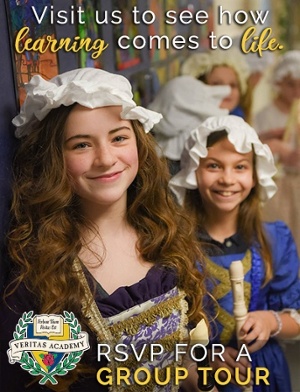Have you ever witnessed a miracle?
The Bible outlines many miraculous events. Some of them, however, may not make much sense at first glance. Take this one from Mark 8:22-26
“And they came to Bethsaida. And some people brought to him a blind man and begged him to touch him. And he took the blind man by the hand and led him out of the village, and when he had spit on his eyes and laid his hands on him, he asked him, “Do you see anything?” And he looked up and said, “I see people, but they look like trees, walking.” Then Jesus laid his hands on his eyes again; and he opened his eyes, his sight was restored, and he saw everything clearly. And he sent him to his home, saying, “Do not even enter the village.”
Why would Jesus half-way heal this fellow first? Why this unconventional method? (We won't dive into the answers here, but if you want a hint, the answer is not in the text, but rather in the context.)
 Here at Veritas I have seen a few miracles that still have me shaking my head. I once heard a student recite 700 digits of Pi. Seven hundred! Then there was the time when one of our characters for our annual third grade Zeus' Family Reunion play was sick the day of the performance. Being that we don't have understudies for this great tradition where every third grader has a part, we began scouring the school for kids who had played the role in the past to fill in. What we found was a 5th grade student who not only remembered that part, but two years after her class's performance she still had the whole play memorized!
Here at Veritas I have seen a few miracles that still have me shaking my head. I once heard a student recite 700 digits of Pi. Seven hundred! Then there was the time when one of our characters for our annual third grade Zeus' Family Reunion play was sick the day of the performance. Being that we don't have understudies for this great tradition where every third grader has a part, we began scouring the school for kids who had played the role in the past to fill in. What we found was a 5th grade student who not only remembered that part, but two years after her class's performance she still had the whole play memorized!
The point is, while these and many other kids' memories may seem miraculous and leave us bewildered at how they remember these obscure things, their excellent fact absorption and recall skills indicate how they are wired at this stage, and we take full advantage of that incredible nature in our education.
I have been working with my teachers through the book The Liberal Arts Tradition by Kevin Clark and Ravi Jain. It's a fun book and it looks back at classical education in the past. In this book, the authors discuss why, for elementary aged kids, we teach the following three crucial things: Grammar, Piety, and Gymnastics.
 Grammar
Grammar
Grammar, in this case, does not refer to proper punctuation and sentence structure (though we do indeed teach that as well). In Classical Christian Education, grammar refers to the basics facts of things. Why do we focus on grammar, or facts memorization? Because God gave children great memories.
God made our minds to inductively figure out an entire spoken language in our infancy years. Isn’t that incredible? Using memorization in the younger years simply teaches children based on the way our Lord designed them in his wisdom!
We learn the basic facts of things- such as reading and the rudiments of math - because out of these two things comes most of education. We learn the basic facts of history and geography - and put them to music so it's extra fun! - so that the kids can go deeper into the concepts we learn later and pull from contextual memory that's been tucked away in their minds.
And the great thing is, most of those facts stay tucked in their minds for years to come! We stopped into a 10th grade Omnibus class and asked if anyone could still sing the 2nd grade history song, and some of the girls stepped up and volunteered to try it for the camera! They had fun digging into their memories from 8 years ago to pull out these fun facts, with no practice at all!For an informative and entertaining 3 minutes, check out the video below, where we combine our 2019 grammar school students with the sophomores singing our second grade history song, taking us from Creation through Egypt's rise and fall.
My wife, Emily, who teaches fourth grade here, attests to how well this works.
"At this age, they love to sing songs, they love to chant, and it sticks in their brain," she says. "We get it in there now, when they're geared that way, and then it keeps ringing in their ears down the road. Then when they're in secondary school, they don't have to worry so much about memorizing dates and details because it's there. So, the teachers can go deeper into the concepts because they've already got the foundation."
Don’t miss the underlying, earth-shattering assumption: there is truth, and it is good for our children to hide it in their hearts!
Piety
We focus on Piety - that is, spiritual development and reverence for God - because it is the grammar of living in community.
 Some of my most fun mistakes as a father are based in my desire to teach my own kids about God. I remember when I toiled to teach my young daughters the Lord's Prayer; granted, this may have been rooted in prideful motives, as I really just wanted to impress pastors and other church leaders who would visit our home. It backfired a bit when one time, my then-four-year old daughter proudly recited the Lord's Prayer in front of visitors saying "Our Father, who art in heaven, hallowed be MY name. MY kingdom come. MY will be done." You get the point. I suppose a truer prayer has never been spoken.
Some of my most fun mistakes as a father are based in my desire to teach my own kids about God. I remember when I toiled to teach my young daughters the Lord's Prayer; granted, this may have been rooted in prideful motives, as I really just wanted to impress pastors and other church leaders who would visit our home. It backfired a bit when one time, my then-four-year old daughter proudly recited the Lord's Prayer in front of visitors saying "Our Father, who art in heaven, hallowed be MY name. MY kingdom come. MY will be done." You get the point. I suppose a truer prayer has never been spoken.
But, back to the tenet of piety, why did our Classical forefathers find this important in teaching little ones? We teach children the basics of God to help them love what is good and despise what is evil. That is why we tell them great stories.
We also teach them the rules of our faith even before they can know the content of all of our faith. Consider Galatians 4:1-5, where we see that God uses the rules of piety to form a character that is prepared for an even deeper faith in Christ:
“I mean that the heir, as long as he is a child, is no different from a slave, though he is the owner of everything, but he is under guardians and managers until the date set by his father. In the same way we also, when we were children, were enslaved to the elementary principles of the world. But when the fullness of time had come, God sent forth his Son, born of woman, born under the law, to redeem those who were under the law, so that we might receive adoption as sons.”
In her essay The Lost Tools of Learning - a work that was instrumental in bringing about today's Classical Christian Education movement - Dorothy Sayers touches on this idea of teaching kids "big" things that some people may think is above their heads. Sayers says:
"...but it is as well that anything and everything which can be usefully committed to memory should be memorized at this period, whether it is immediately intelligible or not. The modern tendency is to try and force rational explanations on a child's mind at too early an age. Intelligent questions, spontaneously asked, should, of course, receive an immediate and rational answer; but it is a great mistake to suppose that a child cannot readily enjoy and remember things that are beyond his power to analyze--particularly if those things have a strong imaginative appeal."
Since God is truly the most imaginative being, and the author of the greatest story ever told, that is why these young ones are ripe for learning by heart the truths of Scripture, even if they can't fully wrap their heads around the depth of their meaning yet.
Gymnastics
And finally, one more exciting thing to incorporate in a good education for little ones. We focus on Gymnastics...because we really don’t have any other choice (they just have that much energy!)
If you want your kids to be able to soak up something and focus appropriately, you must allow them to use their whole bodies, to expend their energy, and to have fun doing it. That is why our learning at Veritas —as evidenced in things we practice in memory period breakfast—is so active!
Remember, God put us in this world AND he filled the world with truth AND He filled our hearts with a desire to find the truth! What a wonder!
A fable that is widely studied in the Classical Rhetoric tradition is that of the Frog and the Scorpion. The story goes something like this: There is a frog and a scorpion sitting on the bank of a river, wishing to cross. The scorpion, being unable to swim, asks if he can ride on the frog's back across the river. The frog refuses on the grounds that he believes the scorpion will sting him. The scorpion assures the frog that he will not sting (because after all, that would lead to the demise of them both), and after some debate, they embark on the journey through the water, with the scorpion riding atop the frog. Midway across the river, the scorpion stings the frog. As the ill-fated creatures are drowning, the dying frog asks the scorpion why he stung. The scorpion replies, "I couldn't help it. It's in my nature."
 Likewise, I currently have the privilege of teaching our 12th Graders in Omnibus, where we are studying Anna Karenina. The sweeping novel has a character named Alexei Vronsky, a true scoundrel if you will. He's awful. As I was asking our students to describe this character's nature, one girl piped and said simply "Players gonna play."
Likewise, I currently have the privilege of teaching our 12th Graders in Omnibus, where we are studying Anna Karenina. The sweeping novel has a character named Alexei Vronsky, a true scoundrel if you will. He's awful. As I was asking our students to describe this character's nature, one girl piped and said simply "Players gonna play."
My point in sharing these two anecdotes? Scorpions are going to sting; players are going to play; and kids are going to soak up whatever is around them.
So, here at Veritas, that's why we do things like Memory period, and all this great, impressive memory work with our younger students. It's so they can soak up all these good things, so that, like a sponge, this goodness is what flows out when they're pressed in later years.






